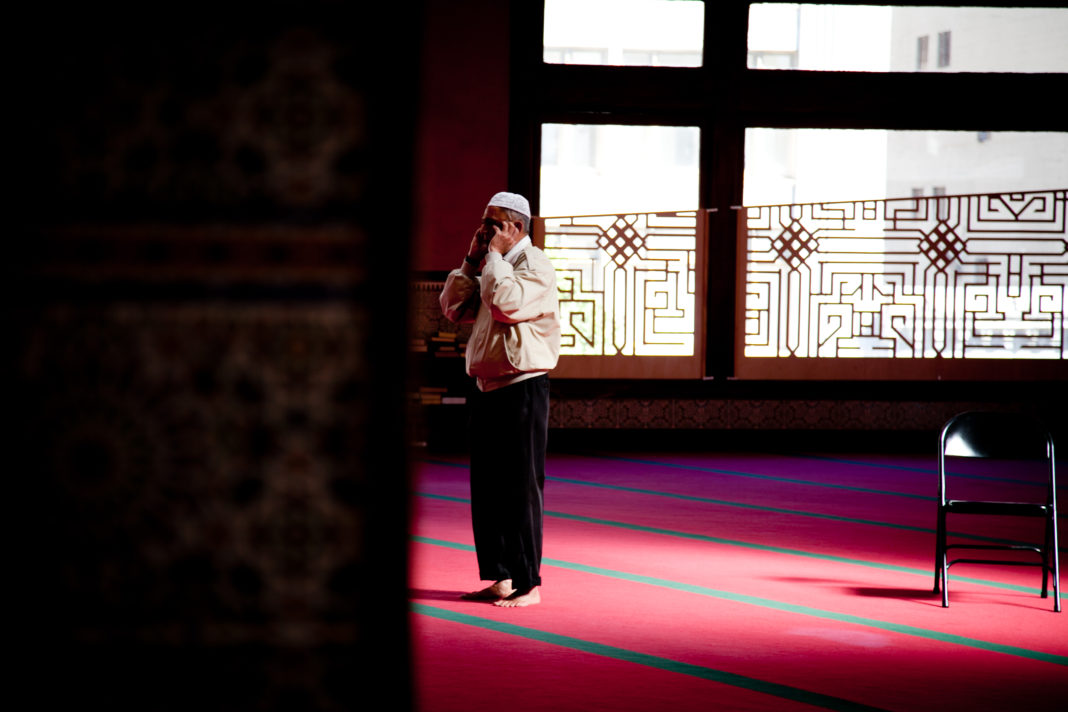Our aḥādīth include thousands of narrations compelling us to—or away from—particular actions. These narrations result in legal rulings that vary in nature from obligatory to forbidden. Many of these narrations deal with various sunan (singl. sunnah, “normative practices”) that are not widely known, but can easily be incorporated into one’s daily worship and devotion. Here we will briefly mention practices pertaining to the opening takbīr of the ritual prayer (ṣalāh, namāz) that a practicing Muslim performs at least five times a day. The most common practice is to recite “Allahu akbar” once while raising the palms facing outward near the level of the ears. Although this practice fulfills the religious requirement, it is actually better to recite more than a single takbīr.
The following excerpt is from the contemporary fiqh text, Minhāj al-Ṣāliḥīn, of Sayyid ʿAlī al-Husaynī al-Sīstānī:
مسألة ٥٨٥ : يجزئ لافتتاح الصلاة تكبيرة واحدة ويستحب الإتيان بسبع تكبيرات، والأحوط الأولى أن يجعل السابعة تكبيرة الإحرام مع الإتيان بما قبلها رجاءً
Issue 585: One takbīr (saying “Allahu akbar”) is sufficient for beginning the ritual prayer. It is recommended to begin it with seven takbīrs. However, it is a recommended precaution to intend the final, seventh takbīr as the formal opening (takbīrat al-iḥrām) while the preceding takbīrs should be performed with the intention of seeking Allah’s reward.
This recommended precaution means that instead of intending one of the first six takbīrs as the takbīrat al-iḥrām, i.e., the official beginning of prayer, you intend only the last of them to be as such. One would perform six takbīrs with the intention of hoping for Allah’s reward—that is, the hope that this action is desirable, technically known as niyyat al-rajāʾ or rajāʾ al-maṭlūbiyyah—and then perform a seventh takbīrah as the single takbīrat al-iḥrām.
And from Sayyid al-Sīstānī’s commentary on ʿUrwat al-Wuthqā:
مسألة ١٠ : يستحب الإتيان بست تكبيرات مضافا إلى تكبيرة الاحرام فيكون المجموع سبعة ، وتسمى بالتكبيرات الإفتتاحية ، ويجوز الاقتصار على الخمس وعلى الثلاث ، ولا يبعد التخيير في تعيين تكبيرة الاحرام في أيتها شاء ، بل نية الاحرام بالجميع أيضًا
Issue 10: It is recommended to perform six takbīrs in addition to the takbīrat al-iḥrām, totaling seven takbīrs altogether. They are called “al-takbīrāt al-iftitāḥiyyah”. It is permissible to cut back and only perform five or three takbīrs [instead of seven]. Selecting any one of these takbīrs to be the formal opening is correct, as is intending all of them to be the formal opening.
Sayyid al-Sīstānī’s footnote here explains that intending all seven as the formal opening is apparently the recommended practice (huwa al-aẓhar).
Here are some of the narrations regarding this sunnah. For brevity, the chain of narrators is truncated in the translation. These aḥādīth are from volume 6 of Wasāʾil al-Shīʿah by the respected jurist, Shaykh al-Ḥurr al-ʿĀmilī.
وباسناده عن محمّد بن علي بن محبوب عن محمّد بن الحسين عن صفوان عن ابن بكير عن زرارة قال: رأيت أبا جعفر (عليه السلام) أو قال: سمعته استفتح الصلاة بسبع تكبيرات ولاءً
Shaykh al-Ṭūsī with his chain of narrators back to Zurāra: He said: I saw—or he said I heard—Abu Jaʿfar al-Bāqir begin his ritual prayer with seven takbīrs in succession.
وعنه عن أحمد عن الحسين عن القاسم بن محمّد عن علي عن أبي بصير عن أبي عبد الله (عليه السلام) قال: إذا افتتحت الصلاة فكبّر إن شئت واحدة وإن شئت ثلاثاً وإن شئت خمساً وإن شئت سبعاً وكلّ ذلك مجزٍ عنك غير أنّك إذا كنت إماماً لم تجهر إلّا بتكبيرة
Abū Baṣīr from Abu ʿAbdillāh al-Ṣādiq. He said: When you begin your ritual prayer, if you like, begin with a single takbīr. And if you wish, with 3 takbīrs. And if you wish, with five. And if you wish, then seven. Any of that will suffice for you. However, if you are leading a congregation in prayer, then only recite one of these takbīrs aloud.
محمّد بن علي بن الحسين باسناده عن زرارة عن أبي جعفر (عليه السلام) أنّه قال: خرج رسول الله (صلّى الله عليه وآله) إلى الصلاة وقد كان الحسين (عليه السلام) أبطأ عن الكلام حتّي تخوفوا أنّه لا يتكلّم وأن يكون به خرس فخرج به (عليه السلام) حامله على عاتقه وصفّ الناس خلفه فأقامه على يمينه فافتتح رسول الله (صلّى الله عليه وآله) الصلاة فكبّر الحسين (عليه السلام) فلمّا سمع رسول الله (صلّى الله عليه وآله) تكبيرة عاد فكبّر فكبّر الحسين (عليه السلام) حتّى كبّر رسول الله (صلّى الله عليه وآله) سبع تكبيرات وكبّر الحسين (عليه السلام) فجرت السنة بذلك
Shaykh al-Ṣadūq with his chain of narrators to Zurāra from Abu Jaʿfar al-Bāqir. He said: The Messenger of Allah left to pray while Ḥusayn had not started speaking, to a point where they feared that he would never talk or that he was mute. So he went out carrying Ḥusayn on his shoulder. The people lined up behind him, and he stood Ḥusayn up by his right side. Then the Messenger began the prayer and Ḥusayn recited the takbīr. So when the Messenger heard his takbīr, he repeated and recited a takbīr. Then Ḥusayn recited a takbīr. This continued until the Messenger had done seven takbīrs and Ḥusayn had done the (seven) takbīrs. So from that the tradition circulated.
و في (العلل): عن علي بن حاتم عن القاسم بن محمّد عن حمدان بن الحسين عن الحسن بن الوليد عن الحسن بن إبراهيم عن محمّد بن زياد عن هشام بن الحكم عن أبي الحسن موسى (عليه السلام) قال: قلت له: لأيّ علة صار التكبير في الافتتاح سبع تكبيرات أفضل-إلى أن قال-قال: يا هشام إن الله خلق السماوات سبعاً والأرضين سبعاً والحجب سبعاً فلمّا اسرى بالنبّي (صلّى الله عليه وآله) وجعل يقول الكلمات التي تقال في الافتتاح فلما رفع له الثاني كبّر فلم يزل كذلك حتى بلغ سبع حجب فكبّر سبع تكبيرات فلتلك العلّة يكبّر للافتتاح في الصلاة سبع تكبيرات
Hishām b. al-Ḥakam from Abu al-Ḥasan Mūsa al-Kāẓim. He said: I said to him: For what reason did the seven takbīrs in the opening of the prayer become superior?…He, peace be with him, said: O Hishām! Verily Allah created seven heavenly realms, seven earthly realms, and seven veils. When the Prophet was taken on his miraculous journey and it was as if he were two bow lengths or even closer to his Lord, He lifted for him one of the veils, so the Messenger recited a takbīr and began saying the words that are said during the opening of prayer. Then when Allah lifted for him the second veil, he recited a takbīr. This continued until seven veils were lifted and thus he had recited seven takbīrs. So for that reason, seven takbīrs are recited in the opening of the prayer…
The above hadith is worth meditating upon. It reminds us of the ḥadīth that states that the ritual prayer is the spiritual ascension—miʿrāj—of the believer and the lifting of the veils between the worshipping believer and Allah.
For those more ambitious and capable, there is a recommended set of supplications to recite between the takbīrs.
From Minhāj al-Ṣāliḥīn:
مسألة ٥٨٨ : يجوز الإتيان بالتكبيرات ولاءً بلا دعاء، والأفضل أن يأتي بثلاث منها ثم يقول: (اللهم أنت الملك الحق، لا إله إلا أنت سبحانك إني ظلمت نفسي، فاغفر لي ذنبي، إنه لا يغفر الذنوب إلا أنت) ثم يأتي باثنتين ويقول: (لبيك، وسعديك، والخير في يديك، والشر ليس إليك، والمهدي من هديت، لا ملجأ منك إلا إليك، سبحانك وحنانيك، تباركت وتعاليت، سبحانك رب البيت) ثم يأتي باثنتين ويقول: (وجهت وجهي للذي فطر السماوات والأرض، عالم الغيب والشهادة حنيفًا مسلمًا وما أنا من المشركين، إن صلاتي ونسكي ومحياي ومماتي لله رب العالمين، لا شريك له، وبذلك أمرت وأنا من المسلمين) ثم يستعيذ ويقرأ سورة الحمد
Issue 588: It is permissible to perform the takbīrs in succession without any supplication (duʿāʾ). However, it is most virtuous to do three takbīrs [from the seven] and then say:
اللهم أنت الملك الحق، لا إله إلا أنت سبحانك إني ظلمت نفسي، فاغفر لي ذنبي، إنه لا يغفر الذنوب إلا أنت
O my Lord! You are the King, the Truth. There is not deity but You, all glory be Yours. Verily, it is I who have wronged myself, so forgive me of my sins. Surely none pardon sins except You.
Then do two takbīrs and say:
لبيك، وسعديك، والخير في يديك، والشر ليس إليك، والمهدي من هديت، لا ملجأ منك إلا إليك، سبحانك وحنانيك، تباركت وتعاليت، سبحانك رب البيت
I am here at Your service. All good is in Your hands and evil does not reach You. The guided is he whom You have guided. There is no sanctuary from You except with You, all glory be Yours. You are the Blessed and Sublime. All glory to You, Lord of the House.
Then do two more takbīrs and say:
وجهت وجهي للذي فطر السماوات والأرض، عالم الغيب والشهادة حنيفًا مسلمًا وما أنا من المشركين، إن صلاتي ونسكي ومحياي ومماتي لله رب العالمين، لا شريك له، وبذلك أمرت وأنا من المسلمين
I have turned myself to the Originator of the Heavens and the Earth, Knower of the unseen and testimony while I am a true submitting believer and I am not from the polytheists. Verily my prayer, my ritual, my life, and my death belong to God, He who has no partner. To this I have been commanded and I am from those who submit.
Then seek refuge from the accursed Satan (أعوذ بالله من الشيطان الرجيم) and recite Surat al-Ḥamd (al-Fātiḥah).




